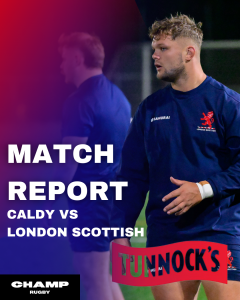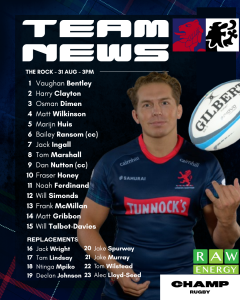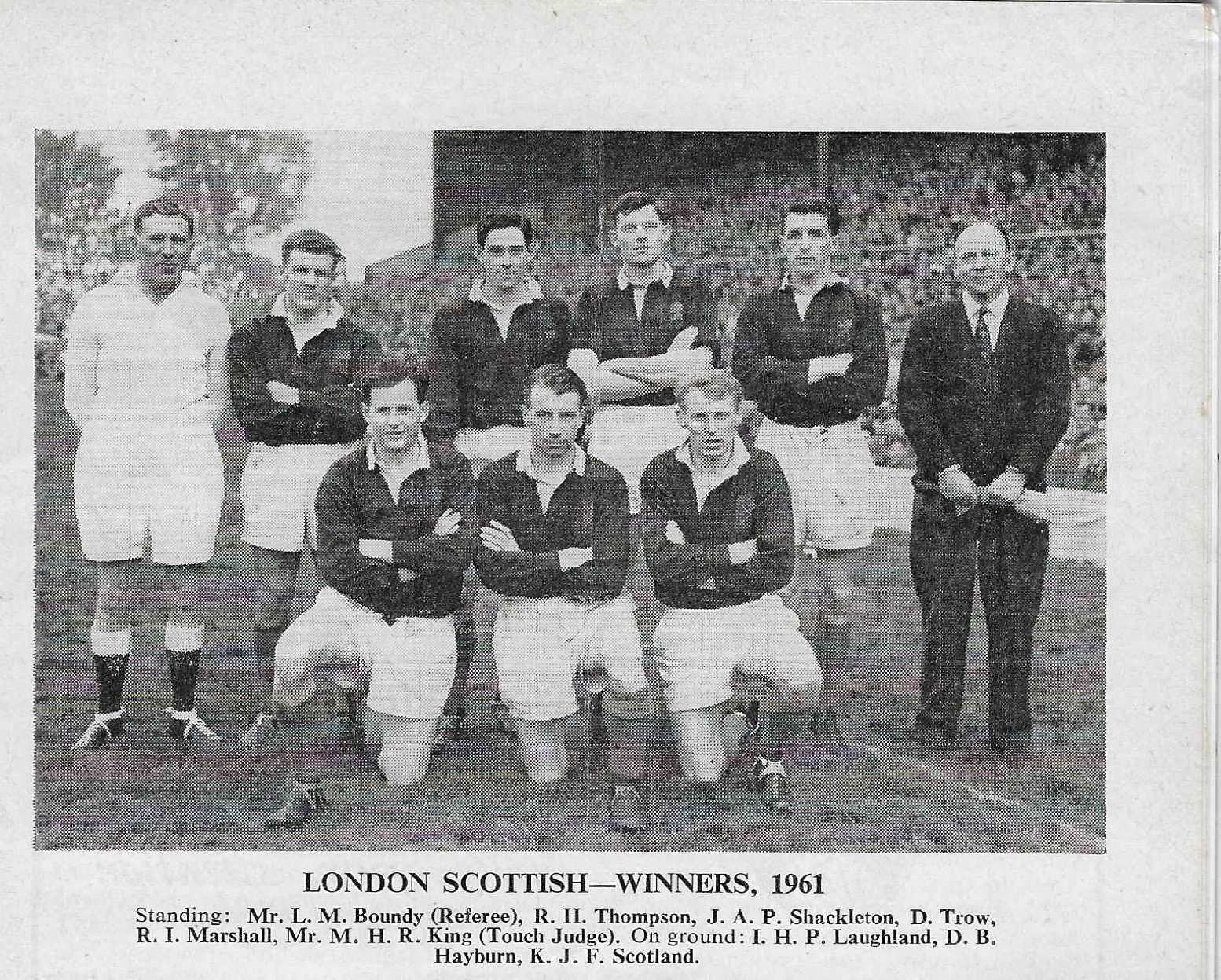
Past players are too often dubbed “legends” but the epithet can properly be applied to Iain Laughland, who died earlier this month.
London Scottish President Paul Burnell this week paid tribute to the man who shaped his career: “Iain was one of the best fly halves for Scotland and for the club and his knowledge of the game was remarkable; then during his second career as an administrator he had a critical influence on my career, spotting me at Leicester, getting me into the Exiles set up when he was convenor, and from there to London Scottish and Scotland. He loved the club and he loved his rugby, and he was a lovely man too. He won’t be replaced.”
Whether because he was the choice of Bill McLaren at fly half among those who wore the number 10 shirt for Scotland between 1950 and 2003 – ahead of the likes of John Rutherford or London Scottish teammate Gordon Waddell – or because he could be credited with more or less reinventing the Sevens game south of the Border, “Logie” was above all a London Scottish legend for his contribution during a stellar playing career and then after hanging up his boots, as a fine administrators for many more years, setting himself the task of identifying international class talent among the Anglo-Scots community.
Iain Hugh Page Laughland was born in Mumbai (then Bombay) in 1935, where his father was a banker. He came home to Croftinloan Prep School at the age of 9 and then went on to Merchiston Castle School. Sport came easily and besides playing rugby he captained Scottish Schools at cricket, and then on leaving school for national service with the Seaforth Highlanders, turned out for Nairn County FC while stationed there.
With the army behind him, he headed to London for a career in the City, but abandoned that for Benn Brothers who published trade journals. Living with his parents in Buckinghamshire at the time, he went out for a run one evening and his mother asked him what was he doing? and he replied “I am going to play rugby for Scotland!”
“Richmond,” he wrote in the London Scottish Centenary History, “where everything revolved around rugby football, seemed the ideal place to be on Saturday afternoons.” Logie had spotted that several of the players, at London Scottish, had been his schoolmates or opponents only three years previously, and he “decided to take the plunge.” Travelling across London and changing in Nissan huts with the 5th XV was a brief experience; he quickly worked his way up to 1st XV level during the 1956/57 season, and embarked on a playing career of some ten years.
Logie followed Eric Cruickshank and Mac Wylie as captain for the 1959-60 season and then “that astute tactician,” as Frank Morris would call him in the club centenary history, got a rare second stint as captain for the 1963-64 season, which proved to be the 1st XV’s best in terms of results. In those days before formal league rugby, The Daily Telegraph computed the results between all the major clubs in England and Wales each season, and named London Scottish as the English champions that year and the following one too.
Stewart Wilson, who joined the club when Logie was in his prime, writes of those days before professional coaches called the tune:
“Iain provided the guidance that enabled talented players to demonstrate their abilities and encouraged younger members to realise their potential… He understood the need for a game plan in rugby, but believed strongly in the need to play things “off the cuff” once the game got going.“
By then he was a seasoned international, winning the first of his 31 caps in Paris in January 1959, aged 23, in a side that included four other London Scots in the back line and two more at forward. Logie was picked at inside centre, his club mate Gordon Waddell being the incumbent at fly half, where Logie would play most of his club rugby. He waited a year for his next cap, and his first game in Scotland’s number ten jersey was not till January 1961 when the player who would be feted for his tactical ability and creative vision fashioned Scotland’s only score against South Africa by mucking up an attempted drop goal. Bill McLaren later described what happened: “The ball sliced off Laughland’s boot but Arthur Smith … screamed up the wing like a shell and got the touch just before the ball rolled out of play.”
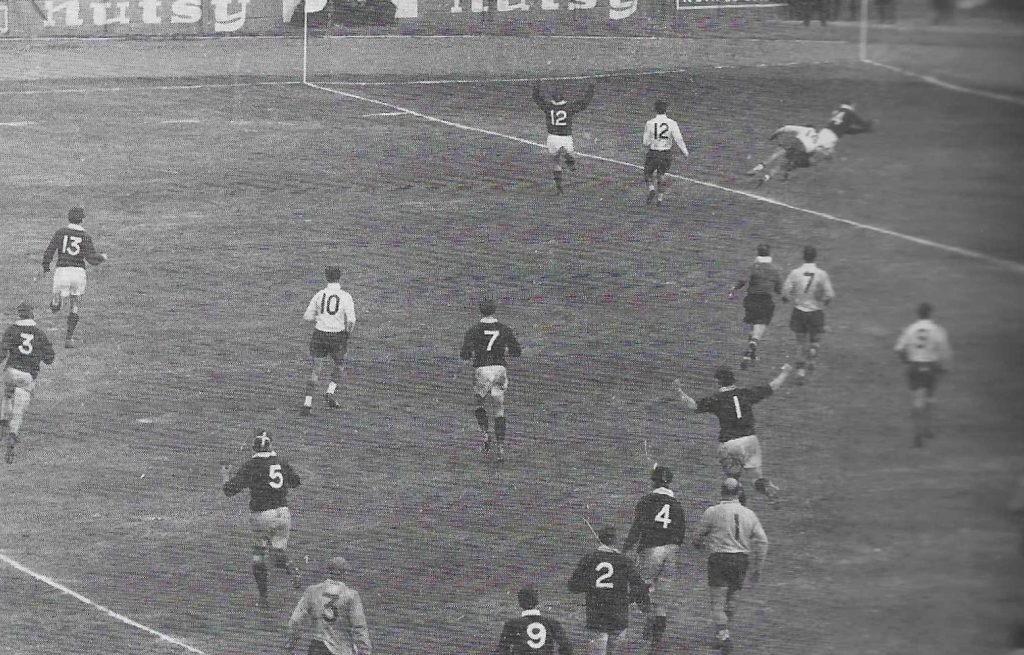
It’s tempting to think Logie practiced the move, for two years later in Paris, and with the scores level in injury time, as the historian John Griffiths noted “Laughland hooked an attempted drop goal. But [Ronnie] Thomson raced across from the right wing to gather the bouncing ball and scored to the left of the posts for Ken Scotland to convert,” a score involving three London Scottish team-mates – there were seven on the pitch and two more who would also play for the club. Six of them feature in the photo of Thomson diving over.
Perhaps the career highlight would come on 19th March 1966 when, having taken the captaincy from his teammate Stewart Wilson in the previous match, Logie lifted the Calcutta Cup.
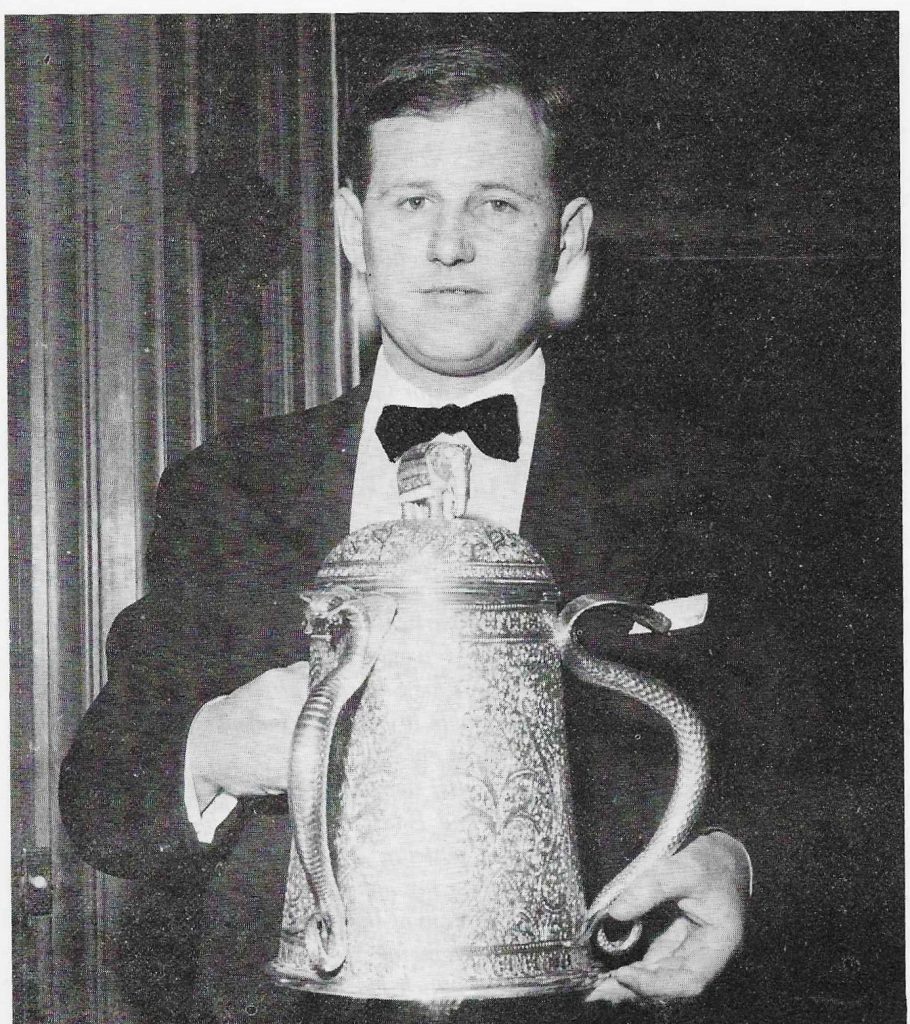
But then, tipped to go on and lead the Lions to Australia and New Zealand that summer, injury forced him to withdraw, and Mike Campbell-Lamerton would become the third London Scot to lead the British Isles. He returned in March 1967 for one final cap, also against England, and his eighth at fly half, the other 23 all being at centre, and retired from club rugby, although not before being persuaded to tour South Africa as a guest with Harlequins.
As a player though his legacy will surely be as a leader of one of the greatest club Sevens sides ever to emerge outside the Borders.
However you describe it, Logie’s approach to Sevens was truly a game changer. His Wiki entry calls it thus: “he was noted as the architect of the game, changing the play by slowing down to a walking pace, his team showing excellent ball skills and patience before bursting through defences with agility and speed.” As Bill McLaren describes it the style was quite the opposite of Borders “up and at ‘em” pressing:
“London Scottish … were the first I had seen who commanded such pace and ball-handling surety to be able to play sevens rugby in retreat, as they slowed the pace of play with intuitive running off the ball, until a gap appeared.”
Ann Laughland has a more succinct description: “slow … slow … dash.”
With Logie in the side, the club duly reached six consecutive Middlesex Sevens finals, and won five. On four of these occasions Logie was the skipper calling the game plans, who lifted the cup.
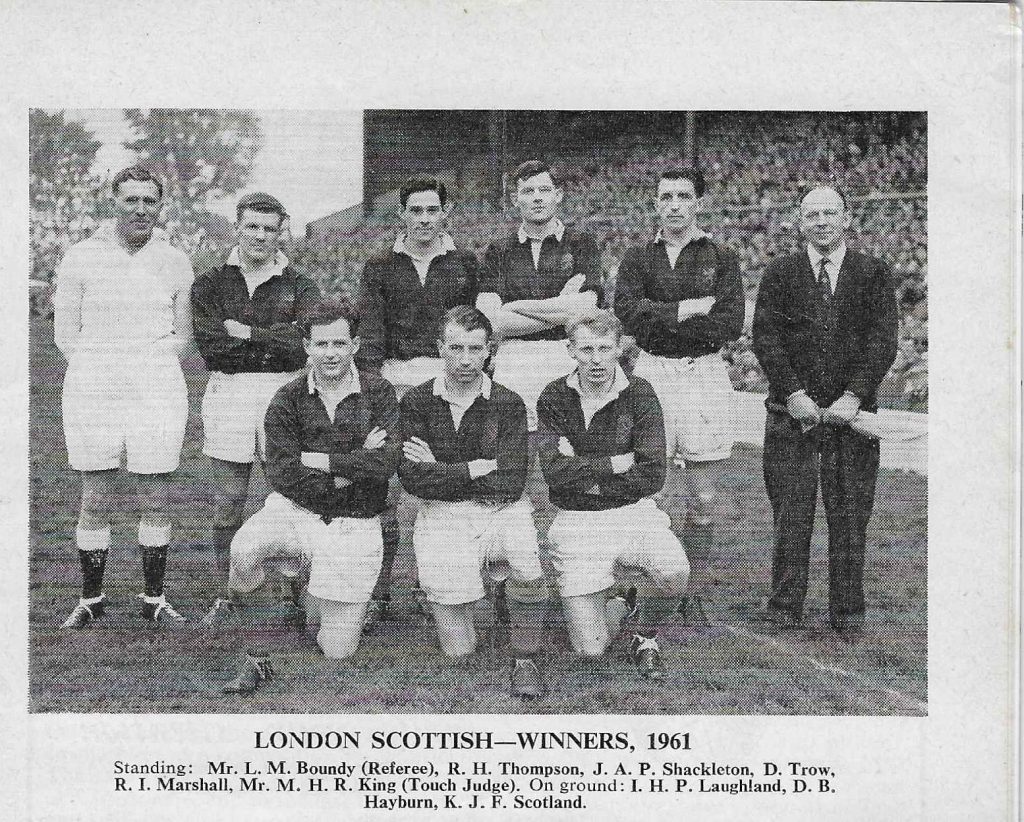
The great Welsh and Lions pre-war full back Vivian Jenkins, by now turned journalist – eulogised in the Sunday Times over the 1961 triumph:
“All the world knows of course that the “wee” game had its origins in Scotland, and, if ever evidence was needed that the Scots, more than anyone else, must have this game at their fingertips, it was provided here…
The winning seven, with every one of their backs – Laughland, Scotland, Shackleton and Thomson – an international, weaved fairy patterns of a kind beyond the scope, apparently, of mere Sassenachs, or anyone else nurtured south of the border.
The way in which they switched the direction of the attack from this side of the field to that, and then back again, was a real education and they made it all look so easy, giving themselves, it seemed, all the time in the world, and never hurrying until the vital moment presented itself.
Then they were in top gear in a flash, and with the speed and know-how of those four internationals and the worrying and bustling of their forward trio… there was no stopping them.“
Stewart Wilson recalls: “Asked once about how he acquired his phenomenal speed off the mark, he attributed it to the day he had been sitting on the latrine in Aden with the Army, when an Arab sniper put a bullet between his legs.“ Bill McLaren, a regular at the Sevens, also wondered at what he saw, with “Iain Laughland the maestro tactician and himself very quick off the mark.”
While the Middlesex was then the pre-eminent Sevens tournament outside Scotland, Logie also took his team to the birthplace of the game, winning at Melrose in 1962 and 1965; without Logie, Scottish were runners-up in 1964; they were semi-finalists in 1963 and 1966. Seldom can a club side have so dominated the shorter game at its most stellar tournaments. No club had previously won Middlesex and Melrose in the same Season. Logie’s London Scottish managed the feat twice. How proud he will have been when London Scottish returned to Melrose in 2019, and not only collected the Ladies Cup again but did so playing in the style he might himself have coached.
His playing days over, Logie devoted the next 35 years to giving back to the game. From club Press Secretary during 1966-70, and long years on the club committee, Logie joined the Scottish Rugby Union General Committee in 1986/87. His main focus was as convenor of the Anglo-Scots or Exiles, and he took special interest in identifying Anglo-Scots with international potential, unearthing among others Iain Morrison and future captains David Sole and Rob Wainwright.
Wainwright remembered him this week:
“For a man who achieved so much in the game, Logie put a huge amount back after hanging up his boots. Clearly he had a love for the game, both the spectacle on the pitch and the buzz of the changing room. While I never saw him play, I spent many happy times with him, and received a lot of support as an emerging player, when he was putting his prodigious energies into the Anglo Scots, energies that paid dividends in Anglo successes and benefits to the national squad. He was ultimately rewarded for all this hard work for Scottish rugby with a well-deserved Presidency. Very sad to hear we had lost him, though it kindled some halcyon memories from the 80s.“
Logie was elected President of the SRU for the 2000/01 season, became a Vice-President of the Club in 1998/99 and was inducted into the London Scottish Hall of Fame in 2007. As Graham Law remembered, writing the official tribute for the SRU: “To those who only knew him as an administrator, it’s hard to recall him without smiling. He loved to laugh and had a sense of mischief about him.” Ross Luke recalls: “Ian was also a great gentleman and leader. His record as an administrator speaks for itself. He was modest and almost diffident but a good friend to all in the club who knew him.” It was typical of Logie that in the club history he swerved the credit for the Sevens success and attributed it to Ken Scotland.
Off the field, he was seldom far from his golf clubs first at Beaconsfield and then at Rye, and at his peak played off three.
His lifelong friend, former club captain and president Robin Marshall, recalled:
“Logie had the deepest possible understanding of any game of rugby that he watched or took part in or planned. Add to this his own lightning speed of reaction and you have summed up a very unusual sportsman. It would be wrong however to leave the ‘re’ of ‘reactor’ unchallenged. He was himself a creator of situations, sometimes out of nothing, and what he brought to the game he played in was not just speed but ‘surprise’.
The quality of strike in his iron play made one wonder what he might have achieved on the links. The fizz with which the ball came off the cricket pitch when he bowled was the undoing of many opening batsmen. All these were examples of class. The administrative work load (national selector, coaching etc) which he carried for years after his retirement was huge as was his commitment to London Scottish.“
Iain Laughland died peacefully, at home, and is survived by Ann, and by his children Rosie and Andrew and six grandchildren, Tom, Hamish, Harry, Sophie, Max and Oli. A private family funeral and interment will be held on Thursday, August 27 at Rye, East Sussex.
Iain Hugh Page Laughland, born 29 October 1935, died 9 August 2020.
Paul McFarland
August 2020
Stewart Wilson writes:
There are few if any who contributed more in moving the Club to the front rank in terms of playing performance and social life. He would be the first to acknowledge the part played by a President like Sir William (Bill) Macpherson, and a series of Club Captains as distinguished as Robin Marshall, Frans ten Bos and Jim Shackleton, but in reality Iain provided the guidance that enabled talented players to demonstrate their abilities and encouraged younger members to realise their potential. A gifted cricketer and soccer player, he understood the need for a game plan in rugby, but believed strongly in the need to play things “off the cuff” once the game got going. He found this quality difficult to understand in others – playing outside him in a charity match he asked Mike Gibson what he planned to do next, and was amazed when Mike said “It all depends on how the ball comes.”
The Club’s playing record in the 1960s was extremely strong both in terms of results against all other first-class Clubs and in the number of teams it fielded regularly every weekend, usually at least ten and rising as high as thirteen at one time. Iain was immensely proud of London Scottish, its social atmosphere, achievements and playing style, and self-effacing about his own part in building its reputation for running rugby.
It was the Twickenham Sevens, however, that revealed on a bigger stage Iain’s pace, sense of tactics, ability to probe for opponents’ weaknesses and manage a game. His midfield partnership with Tremayne Rodd and Jim Shackleton in Sevens was lethal and legendary and based upon their own form of creative dissonance. The arguments that took place between them before the next move was decided were brutal and impressive to the other backs stationed nearby, and few prisoners were taken before agreement was reached. Away from the pitch, Iain was highly popular throughout the Club not only because of his playing experience but also his approachability and sense of humour, which he often aimed at himself. Asked once about how he acquired his phenomenal speed off the mark, he attributed it to the day he had been sitting on the latrine in Aden with the Army when an Arab sniper put a bullet between his legs.
When Cameron Boyle retired from running the Anglo-Scots Iain was his logical successor, having already served as a Scottish Selector after his playing career ended. His connections and appointment of David Leslie as Coach paid rapid dividends as Anglo-Scots recruits such as David Sole, Chris Gray, Lyndsay Renwick, Richard Cram and Iain Morrison gained International recognition. Iain was determined to win the Districts’ Championship against what he was convinced was the opposition of the SRU, and on one occasion when we lost the “decider” in Glasgow became almost apoplectic about the refereeing and “coaching” from the stands by SRU selectors. He got his revenge eventually only to find that, the Anglo-Scots having won the Championship, it was to be disbanded the following year.
We all had a lot of fun with Iain, both on and off the field, and he contributed a huge amount to our enjoyment of the game and life in general. Last week Bill Macpherson described him as “a fine man” and he certainly was.
Note the club was further saddened to learn that a few days later, Robin Marshall’s wife Jenny died suddenly and our heartfelt condolences go to Robin and his family.
